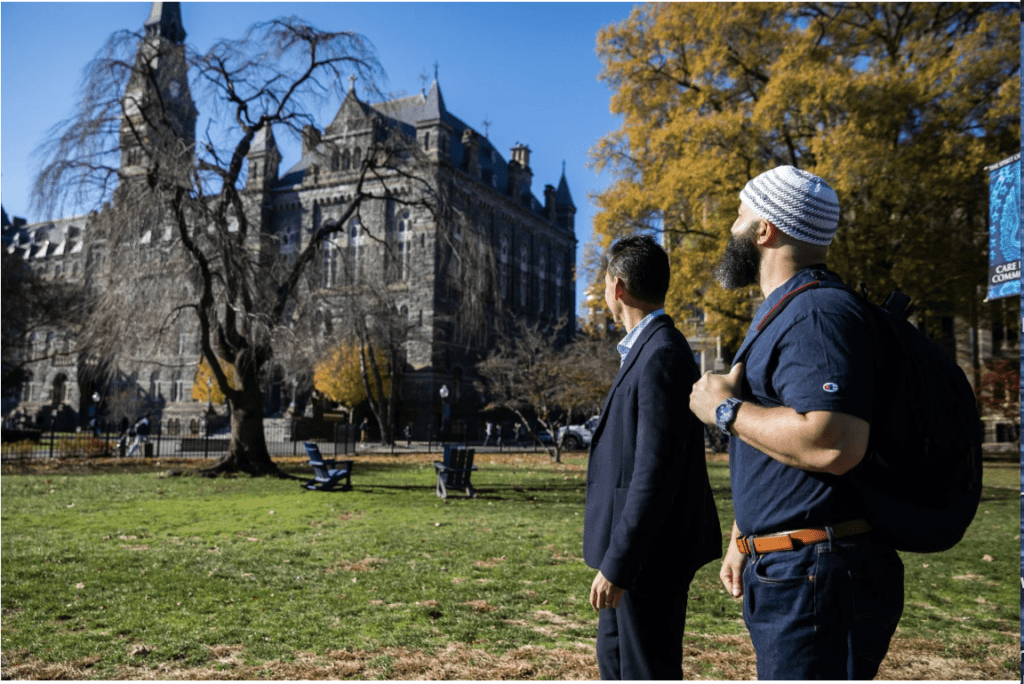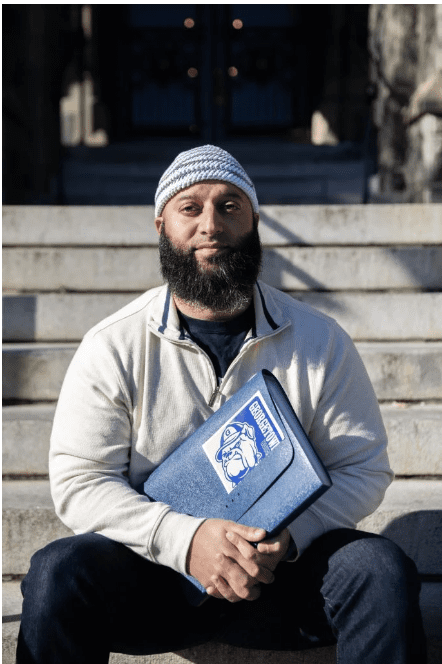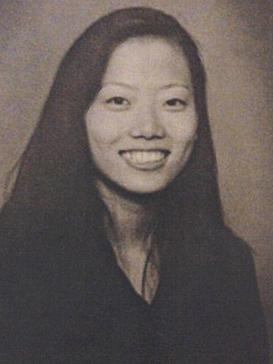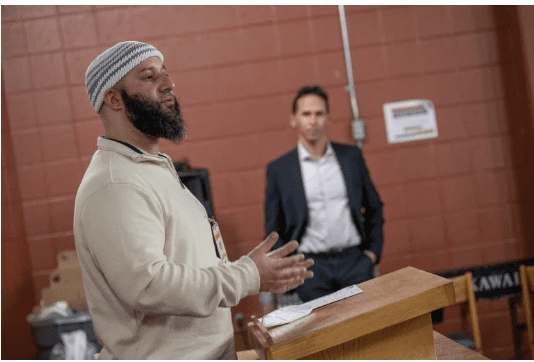Georgetown University’s Prisons and Justice Initiative Hires Adnan Syed
By • December 27, 2022 0 3410

On December 12, when Georgetown University’s new Prisons and Justice Initiative (PJI) hired the key murder suspect featured in the most widely streamed true-crime podcast in history, the university’s Jesuit commitment to social justice became a central theme of worldwide breaking news. A young man’s chance at redemption and helping wrongfully incarcerated prisoners was also in the story’s mix.
With over 300 million downloads and a 2015 Peabody Award – first ever for a podcast – This American Life’s 2014 “Serial” had made 41-year old Adnan Syed a household name. Now, sporting a Hoya t-shirt under his sweater and clutching a binder with a sticker of Georgetown’s Jack the Bulldog logo on the cover, Syed, after serving nearly a quarter-century in prison, was touring the campus of GU where he’s beginning his Bachelor of Liberal Arts program in addition to working as a program associate for the PJI.

Syed holds his Georgetown University binder during a tour of campus. Courtesy Georgetown University.
Convicted in 2000 of the strangulation murder of his former high-school girlfriend Hae Min Lee (then 18-years-old) of Maryland, Adnan Masud Syed spent 23 years of his life sentence incarcerated at Maryland’s Jessup Correctional Institute. As an incarcerated 17-year old, Syed had received his first college acceptance letters (which he had to turn down) in prison.

Hae Min Lee. Wikipedia photo.
In 2014, Syed’s fortunes began to shift, however. After journalist Sarah Koenig, host of the “Serial” podcast, captured the public’s imagination by raising doubts about Syed’s conviction – What was fishy about the cell tower evidence placing Syed near the site of Lee’s buried body? Why didn’t the defense listen to Asia McClain’s testimony placing him in the school library near the time of the murder? – copycat podcasts on Syed’s case also fueled true-crime mania and interest in Syed’s story.
In February 2015, a Maryland court granted Syed a new hearing allowing the introduction of new evidence in the appeal of his murder conviction. In 2016, however, it looked like Syed’s luck had run out. Following a new trial in June 2016, Syed’s attempts to have his murder conviction tossed out were denied. Then, after Maryland’s Court of Special Appeals did indeed vacate Syed’s conviction on the grounds that he had received ineffective counsel in 2018, Maryland’s Supreme Court and the U.S. Supreme Court both refused to allow Syed’s case to be retried.
But then, a blockbuster 2019 4-part HBO cable series called “The Case Against Adnan Syed” also raised further doubts about Syed’s conviction, pointing attention to advances in DNA techniques, prosecutorial blunders and possible anti-Muslim bias in the prosecution of Syed’s case.
In a wild turn of events, the State’s Attorney for Maryland, Marilyn J. Mosby, then announced Syed deserved a new trial. “After a nearly yearlong investigation reviewing the facts of this case, Syed deserves a new trial where he’s adequately represented and the latest evidence can be presented,” she announced from an office that normally seeks to uphold successful prosecutions.
In September 2022, following another trial, Syed’s conviction was finally overturned. Judge Melissa M. Phinn of the Baltimore City Circuit Court vacated Syed’s conviction and allowed Syed to walk out of prison a free man on September 19 smiling before a bank of news cameras and awaiting family and friends.
During the year leading up to his release, Syed was fortunate to have been offered a lifeline from Georgetown University. He had been selected by Georgetown’s new PJI as one of 25 incarcerated students to enter the school’s new Bachelor of Liberal Arts program at a Maryland prison. According to University News, Syed “hopes to continue his Georgetown education and eventually go to law school… to give incarcerated individuals the sense of hope and educational opportunities that he received. He knows firsthand how much it helps.” The new 120-credit interdisciplinary program is offered through GU’s College of Arts and Sciences and is modeled after other undergraduate liberal arts degree offerings on the school’s main campus. The program is expected to be the “only one of its kind in the country where incarcerated men and women can earn a degree in the same classroom.”
Only 72 days after his release, Syed was now touring the campus of Georgetown as a new undergrad and looking “up at the spires of Healy Hall and its historic clock tower,” according to the university’s website. “I’ve seen it so many times on television, and to actually be standing here, it’s another moment that’s unbelievable,” Syed told University News.
In addition to working on behalf of PJI to “address the root causes and consequences of mass incarceration and offer educational programs and training for incarcerated individuals and returning citizens,” Syed will be entering this year’s Making an Exoneree class at Georgetown, helping to “reinvestigate decades-old wrongful convictions, create short documentaries about the cases and work to help bring innocent people home from prison.”
Syed received legal counsel from Erica Suter, a 2003 graduate of Georgetown Law, who directs the University of Baltimore’s Innocence Project Clinic. In her “Serial” podcast, journalist Sarah Koening relied heavily on the work of the Innocence Project.
From prison, Sayed’s study of the humanities, statistics, and writing opened up new ways of seeing the world. “We went to these places our professors would take us, like discussions about philosophy in ancient Greece or ancient Rome. For the first time in 23 years, we didn’t feel like we were in prison. We felt like we were college students learning,” he told University Press. “To go from prison to being a Georgetown student and then to actually be on campus on a pathway to work for Georgetown at the Prisons and Justice Initiative, it’s a full circle moment. PJI changed my life. It changed my family’s life. Hopefully I can have the same kind of impact on others.”
Director of PJI, Marc Howard, spoke highly of Syed’s character and work ethic. “Adnan’s commitment to the program and to his education was clear from the moment he stepped into the classroom,” he said. “We were thrilled to see him exonerated and then be able to welcome him to the Prisons and Justice Initiative. He is one of the most resilient and inspiring people I’ve ever met, and he has so much to offer our team and the other students in PJI programs.”

During his on-campus visit, Syed (left) spoke to Marc Howard’s (right) undergraduate class about the 23-year fight to seek justice in his case and about being a college student himself in Georgetown’s Bachelor of Liberal Arts program.
When asked why he carried his old statistics exam (where he received an A+) and other work from his prison educational program with him in his Georgetown binder, Sayed said “for me, these are not just my grades… [but] they’re a proof of concept that you can take a group of people who are in prison, give them a chance, and they can benefit from it; they can do something great with it… It’s beautiful to see lives changing just from someone saying, “Hey, here’s a chance. What are you going to do with it? So, those are the things that I brought out with me, because they meant the most to me.”

